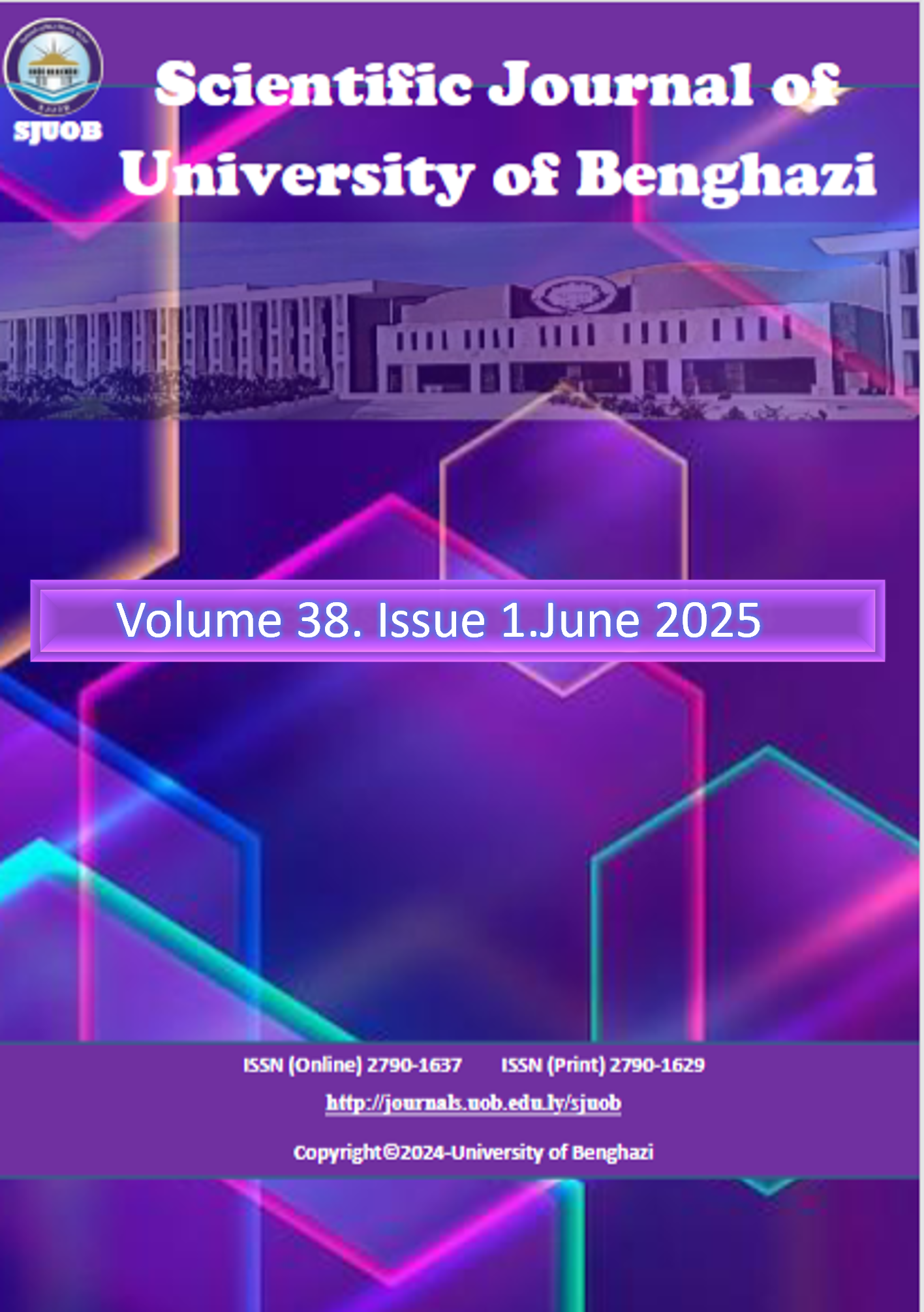A Comparative Study of Perturb & Observe and ANN-Based MPPT Algorithms Under Various Environmental Conditions
DOI:
https://doi.org/10.37376/sjuob.v38i1.7320Keywords:
Artificial Neural Networks, DC-DC Boost converter, MATLAB-Mathematics Laboratory, MPPT, Perturbation and Observation, Solar photovoltaicAbstract
This Photovoltaic energy is a promising renewable energy source because it provides a cleaner alternative to fossil fuels. However, the output power of a PV system is affected by factors like solar irradiance and temperature that can change and influence its performance. Therefore, techniques for maximum power point tracking must be developed so the photovoltaic system produces the maximum power. These techniques guarantee that the PV system has the highest power point at all times regardless of weather conditions. The two types of controllers that are presented in this paper are based on the traditional Perturbation and Observation method and the use of artificial neural networks. From simplicity, low cost, and suitability for medium to large photovoltaic systems, the Perturbation and Observation method is chosen. On the other hand, artificial neural networks is well suited to manage complex systems and may assist in improving maximum power point tracking. In addition, the performance of these two methods is compared to a fuzzy logic-based MPPT approach that was developed and published in a previous study. The controllers were evaluated under various environmental conditions using MATLAB/Simulink. The results demonstrated that the artificial neural networks-based controller outperformed both the Perturbation and Observation and fuzzy logic controller methods in terms of efficiency and overall performance. Additionally, the artificial neural networks approach significantly minimized power fluctuations. However, the fuzzy logic controller method showed a faster response in reaching the maximum power point compared to both the artificial neural networks and Perturbation and Observation techniques.Downloads
References
Esram T, Chapman PL. Comparison of photovoltaic array maximum power point tracking techniques. IEEE Transactions on energy conversion. 2007;22(2):439-49.
Salas V, Olías E, Barrado A, Lazaro A. Review of the maximum power point tracking algorithms for stand-alone photovoltaic systems. Solar energy materials and solar cells. 2006;90(11):1555-78.
Ramos Hernanz J, Campayo Martín J, Zamora Belver I, Larranaga Lesaka J, Zulueta Guerrero E, Puelles Perez E, editors. Modelling of photovoltaic module. International Conference on Renewable Energies and Power Quality (ICREPQ); 2010.
Sharma C, Jain A. Maximum Power Point Tracking Techniques: A Review. International Journal of Recent Research in Electrical and Electronics Engineering (IJRREEE). 2014;1(1):25-33.
Safari A, Mekhilef S. Simulation and hardware implementation of incremental conductance MPPT with direct control method using cuk converter. IEEE transactions on industrial electronics. 2010;58(4):1154-61.
Femia N, Petrone G, Spagnuolo G, Vitelli M. Optimization of perturb and observe maximum power point tracking method. IEEE transactions on power electronics. 2005;20(4):963-73.
Al-Majidi SD, Abbod MF, Al-Raweshidy HS. A novel maximum power point tracking technique based on fuzzy logic for photovoltaic systems. International Journal of Hydrogen Energy. 2018;43(31):14158-71.
Younis MA, Khatib T, Najeeb M, Ariffin AM. An improved maximum power point tracking controller for PV systems using artificial neural network. Przeglad Elektrotechniczny. 2012;88(3b):116-21.
Hussain MT, Sarwar A, Tariq M, Urooj S, BaQais A, Hossain MA. An evaluation of ANN algorithm performance for MPPT energy harvesting in solar PV systems. Sustainability. 2023;15(14):11144.
Roy RB, Rokonuzzaman M, Amin N, Mishu MK, Alahakoon S, Rahman S, et al. A comparative performance analysis of ANN algorithms for MPPT energy harvesting in solar PV system. IEEE Access. 2021;9:102137-52.
Majdi HS. Modeling and Performance Evaluation of Incremental Conductance and Fuzzy Logic MPPT Controllers in Photovoltaic Systems.
Eid MAE, Elbaset AA, Ibrahim HA, Abdelwahab SAM, editors. Modelling, simulation of MPPT using perturb and observe and incremental conductance techniques for stand-alone PV Systems. 2019 21st International Middle East Power Systems Conference (MEPCON); 2019: IEEE.
Jazayeri M, Uysal S, Jazayeri K, editors. Evaluation of maximum power point tracking techniques in PV systems using MATLAB/Simulink. 2014 Sixth Annual IEEE Green Technologies Conference; 2014: IEEE.
Srinivasan S, Tiwari R, Krishnamoorthy M, Lalitha MP, Raj KK. Neural network based MPPT control with reconfigured quadratic boost converter for fuel cell application. International journal of hydrogen energy. 2021;46(9):6709-19.
Cheddadi Y, Errahimi F, Es-sbai N. Design and verification of photovoltaic MPPT algorithm as an automotive-based embedded software. Solar Energy. 2018;171:414-25.
Ali A, Almutairi K, Padmanaban S, Tirth V, Algarni S, Irshad K, et al. Investigation of MPPT techniques under uniform and non-uniform solar irradiation condition–a retrospection. Ieee Access. 2020;8:127368-92.
Jordehi AR. Maximum power point tracking in photovoltaic (PV) systems: A review of different approaches. Renewable and Sustainable Energy Reviews. 2016;65:1127-38.
Saleh AL, Obed AA, Hassoun ZA, Yaqoob SJ, editors. Modeling and Simulation of A Low Cost Perturb& Observe and Incremental Conductance MPPT Techniques In Proteus Software Based on Flyback Converter. IOP Conference Series: Materials Science and Engineering; 2020: IOP Publishing.
Sharma D, Purohit G, editors. Advanced perturbation and observation (P&O) based maximum power point tracking (MPPT) of a solar photo-voltaic system. 2012 IEEE 5th India International Conference on Power Electronics (IICPE); 2012: IEEE.
Lee HH, Dzung PQ, Vu NTD, editors. The new maximum power point tracking algorithm using ANN-based solar PV systems. TENCON 2010-2010 IEEE Region 10 Conference; 2010: IEEE.
Kellal C, Lakhdar M, Kouzou A, Ouacel A, editors. An ANN-based Maximum Power Point Tracking Using DC/DC Boost Converter for PV System. 2023 1st International Conference on Renewable Solutions for Ecosystems: Towards a Sustainable Energy Transition (ICRSEtoSET); 2023: IEEE.
Mishra SK, Sahu JK, Reddy TMPC, editors. MPPT for a Solar PV Array: ANN and P&O Comparison. 2023 IEEE 3rd International Conference on Technology, Engineering, Management for Societal impact using Marketing, Entrepreneurship and Talent (TEMSMET); 2023: IEEE.
Downloads
Published
How to Cite
License
Copyright (c) 2025 Scientific Journal of University of Benghazi

This work is licensed under a Creative Commons Attribution-NonCommercial-NoDerivatives 4.0 International License.



















